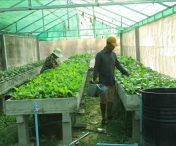
For years, Khmer Organic Cooperative (KOC) company, a local business based in Phnom Penh, Cambodia, has been selling fresh organic vegetables in the market from its own farm. But even if they have their own farm, sometimes they still run out of vegetables to sell. To make up for this, they import vegetables from Thailand and Vietnam.
In 2017, Farmer and Nature Net (FNN) organized a meeting with KOC and farmer producers that are members of the FNN. KOC proposed to buy six kinds of vegetables twice a week, 90 – 120 kilograms each time. The company and the farmers settled with a fixed priced which is higher than the price in the regular market and agreed to negotiate again in six months.
With this opportunity, FNN brought the company to arrange a contract with four agriculture cooperatives which are members of FNN namely:
- Boeung Lach Sambo Phal agricultural cooperative
- Thlok Vien Mean Chhey agricultural cooperative
- Kraing Leav Samaki agricultural cooperative
- Kraing Levea agricultural cooperative

Because of this contract, the farmers now have access to a regular market which will also help them make a better investment plan, coordinate production plan, and generate regular income. “Our members used to make about USD 20 per month, but after this partnership, they now make about USD 80 per month,” expressed Mr. Soun Koy ,Cheak Thoeun and Kok Phoeun.
Innovative Feature
Market-oriented commercial agriculture. Once the market is ensured, the farmers can be better organized and invest on the production effectively.

Impact
- Higher price for the vegetable produce of the farmers, from 2,500 to 3,500 riels (USD 0.61 – 0.86) per kilogram
- The farmers produce vegetables organically which is good for the soil and environment in general.
- Sustainable development
- More income for the farmers

Facilitating Factors
- KOC company has a background on working with small holder farmers. They understand the issues of the farmers so they set flexible terms.
- Farmers are organized so they can maintain production standard.
- Efficient communication between the parties is a factor for success.
Lessons Learned
- The company wants quality produce and consistent supply.
- Need to show evidences to the company such as data, photos, reports, government support, etc. in order to gain their trust for the negotiation
- Traceability system is important in order to maintain quality of the produce.
- Review the contract for high cutting write-off
Recommendations
- The company needs to organize transportation along the national road to get the produce from collecting points. This will be easier to stop cutting write off.
- Establish collecting points for farmers selling vegetables
- Follow a schedule in collecting the produce from one point to another to maintain the freshness of the vegetables
About AFOSP-MTCP2
AFOSP-MTCP2 is a capacity building program funded by the European Union (EU) with co-financing from the International Fund for Agricultural Development (IFAD) and the Swiss Agency for Development and Cooperation (SDC). The program is being implemented in seven ASEAN countries through the consortium Asian Farmers’ Association for Sustainable Rural Development (AFA) and La Via Campesina (LVC). AFOSP-MTCP2 supports the strengthening of national farmers’ organizations (FOs) and their national platform towards improving their institutional capacity to deliver economic services to their members as well as to effectively engage them in policy processes. At the ASEAN level, the consortium AFA – LVC works in partnership with the ASEAN Foundation in expanding the spaces for the engagement of FOs in ASEAN processes.

Comments are closed